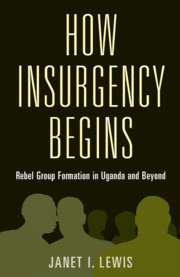Crossref Citations
This Book has been
cited by the following publications. This list is generated based on data provided by Crossref.
2020.
Property without Rights.
p.
392.
2020.
The Political Economy of Development.
p.
110.
2020.
Authoritarian Police in Democracy.
p.
356.
Balcells, Laia
Chen, Chong
and
Pischedda, Costantino
2020.
Do Birds of a Feather Flock Together? Rebel Constituencies and Civil War Alliances.
SSRN Electronic Journal ,
Larson, Jennifer M.
2021.
Networks of Conflict and Cooperation.
Annual Review of Political Science,
Vol. 24,
Issue. 1,
p.
89.
2021.
When People Want Punishment.
p.
258.
Engelbrecht, Georgi
2021.
The logics of insurgency in the Bangsamoro.
Small Wars & Insurgencies,
Vol. 32,
Issue. 6,
p.
887.
McQuinn, Brian
Terry, Fiona
Kaplan, Oliver
and
Gutiérrez-Sanin, Francisco
2021.
Introduction: promoting restraint in war.
International Interactions,
Vol. 47,
Issue. 5,
p.
795.
Thaler, Kai M.
2021.
Military integration and intelligence capacity: informational effects of incorporating former rebels.
Political Research Exchange,
Vol. 3,
Issue. 1,
2022.
Big Data and the Welfare State.
p.
233.
Loyle, Cyanne E
Braithwaite, Jessica Maves
Cunningham, Kathleen Gallagher
Huang, Reyko
Huddleston, R Joseph
Jung, Danielle F
and
Rubin, Michael A
2022.
Revolt and Rule: Learning about Governance from Rebel Groups.
International Studies Review,
Vol. 24,
Issue. 4,
MENG, ANNE
and
PAINE, JACK
2022.
Power Sharing and Authoritarian Stability: How Rebel Regimes Solve the Guardianship Dilemma.
American Political Science Review,
Vol. 116,
Issue. 4,
p.
1208.
Lacher, Wolfram
2022.
How does civil war begin? The role of escalatory processes.
Violence: An International Journal,
Vol. 3,
Issue. 2,
p.
139.
Malone, Iris
2022.
Economic shocks and militant formation.
Research & Politics,
Vol. 9,
Issue. 2,
p.
205316802210914.
Braun, Robert
and
Kienitz, Otto
2022.
Comparative Politics in Borderlands: Actors, Identities, and Strategies.
Annual Review of Political Science,
Vol. 25,
Issue. 1,
p.
303.
Balcells, Laia
Chen, Chong
and
Pischedda, Costantino
2022.
Do Birds of a Feather Flock Together? Rebel Constituencies and Civil War Alliances.
International Studies Quarterly,
Vol. 66,
Issue. 1,
Larson, Jennifer M.
Lewis, Janet I.
and
Rodriguez, Pedro L.
2022.
From Chatter to Action: How Social Networks Inform and Motivate in Rural Uganda.
British Journal of Political Science,
Vol. 52,
Issue. 4,
p.
1769.
Malone, Iris
2022.
Unmasking Militants: Organizational Trends in Armed Groups, 1970–2012.
International Studies Quarterly,
Vol. 66,
Issue. 3,
Butcher, Charles
Braithwaite, Jessica Maves
Pinckney, Jonathan
Haugseth, Eirin
Bakken, Ingrid Vik
and
Wishman, Marius Swane
2022.
Introducing the Anatomy of Resistance Campaigns (ARC) dataset.
Journal of Peace Research,
Vol. 59,
Issue. 3,
p.
449.
Jüde, Johannes
2022.
Making or un-making states: when does war have formative effects?.
European Journal of International Relations,
Vol. 28,
Issue. 1,
p.
209.





